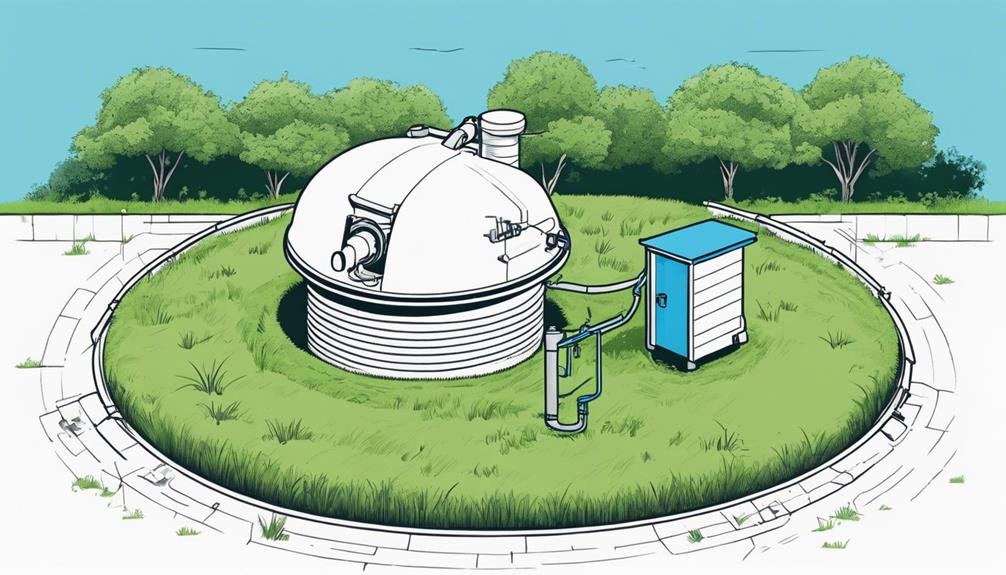Maintaining your septic system is crucial for the well-being of your home. Do you truly understand the intricacies involved in proper care? From the frequency of pumping to the impact of household habits, there are hidden aspects that can significantly influence your system's longevity.
By unraveling these secrets, you can ensure a smoothly running septic system that will save you from potential headaches down the line. Understanding the nuances of septic system care is the key to avoiding costly repairs and protecting your property's value.
Key Takeaways
- Regular maintenance and pumping schedules are vital for septic system longevity and efficiency.
- Monitoring factors like soil composition and bacterial balance is crucial for tank health.
- Signs of neglect, like odors or lush grass, indicate the need for immediate attention.
- Understanding and addressing these key factors are essential for a well-functioning septic system.
Importance of Regular Maintenance

Regular maintenance of your septic system is crucial to ensure its proper functioning and longevity. The importance of scheduling regular inspections can't be overstated, as it's the first line of defense in preventing costly repairs or replacements down the line.
Ideally, you should have your septic system inspected by a professional at least every three to five years, although some factors may necessitate more frequent checks. During these inspections, the technician will assess the levels of scum and sludge in the tank, check for any leaks or blockages in the pipes, and ensure that all components are working as they should.
Benefits of Proper Pumping Schedule
To maximize the efficiency and lifespan of your septic system, adhering to a consistent pumping schedule is essential. By following a regular pumping routine, you can experience significant benefits that positively impact both your wallet and the environment.
One of the key advantages of maintaining a proper pumping schedule is cost savings. Regular pumping helps prevent issues like clogs and backups that could lead to expensive repairs or even system failure.
Additionally, efficient pumping contributes to the longevity of your septic system. When you pump your tank on schedule, you reduce the strain on the system, allowing it to function optimally for a longer period. This not only saves you money in the long run but also minimizes the environmental impact of potential leaks or overflows.
Embracing a consistent pumping schedule is a proactive approach that ensures the efficient operation and extended lifespan of your septic system.
Factors Affecting Tank Health

Maintaining the health of your septic tank depends on various factors that influence its overall functionality and longevity. Soil composition plays a crucial role in septic tank health. The soil around the tank must have the right composition to allow for proper drainage and filtration.
Additionally, maintaining a healthy bacterial balance within the tank is essential for breaking down waste effectively.
Monitoring water usage is another key factor. Excessive water usage can overwhelm the septic system, leading to issues like backups and overflows. Being mindful of water consumption can significantly impact the health of your tank.
Furthermore, avoiding chemical additives is vital. Harsh chemicals can disrupt the natural balance of bacteria in the tank, affecting its ability to function correctly.
Signs of Septic System Neglect
Neglecting proper care for your septic system can result in various signs indicating potential issues that need immediate attention. One common sign of septic system neglect is drain field distress. If you notice lush, green patches of grass over the drain field or standing water in that area, it could indicate that your septic system isn't functioning correctly. Additionally, foul odors around the septic tank or drain field are a clear sign of neglect. These odors can signal a buildup of harmful gases due to a lack of proper maintenance.
To address drain field distress, you should avoid parking vehicles or placing heavy objects over the drain field, as this can compact the soil and disrupt the system's function. Regular pumping and inspections by a professional can help prevent drain field issues. For odor control, consider using septic-safe additives or enzymes to break down waste and reduce odors. Proper maintenance and timely interventions are essential to prevent further damage and ensure the longevity of your septic system.
Frequently Asked Questions
Can I Use Additives in My Septic System to Improve Its Performance?
You should avoid using additives in your septic system without professional recommendations. Additives may not improve performance but could harm your system and the environment. Stick with DIY solutions or consult a septic professional for guidance.
Are There Any Specific Household Products That Should Be Avoided to Prevent Damage to the Septic Tank?
When it comes to your septic system, steer clear of harmful chemicals like bleach and drain cleaners. Opt for septic-safe cleaners to keep things running smoothly. Remember, prevention is key in maintaining a healthy septic tank.
How Often Should I Have My Septic System Inspected by a Professional?
You should have your septic system inspected by a professional every 3-5 years to ensure proper maintenance. Signs of septic system problems include slow drains, gurgling noises, foul odors, and sewage backup. Regular inspections can prevent costly issues.
Is It Necessary to Have the Septic Tank Pumped if I Haven't Noticed Any Issues With My System?
If you haven't noticed any issues with your septic system, it's still necessary to have the tank pumped regularly. Neglecting maintenance can lead to costly problems. Professional pumping can prevent backups, odors, and contamination of groundwater.
Are There Any Ways to Prevent Tree Roots From Damaging My Septic System?
To prevent tree roots from damaging your septic system, consider installing root barriers and scheduling professional inspections for maintenance. These proactive measures can help avoid costly repairs and ensure the longevity of your system.
Conclusion
In conclusion, maintaining your septic system is crucial for its longevity and functionality.
While some may argue that regular maintenance is time-consuming and costly, neglecting your septic system can lead to expensive repairs and environmental damage.
By following a proper pumping schedule, monitoring for signs of neglect, and addressing any issues promptly, you can ensure your septic system operates efficiently for years to come.
Remember, taking care of your septic system now can save you from headaches in the future.

